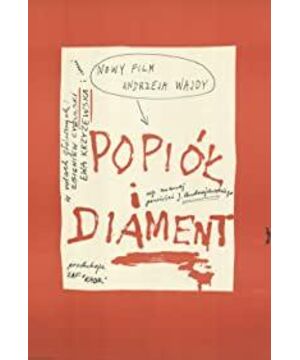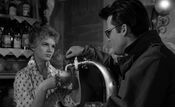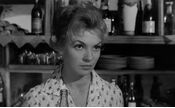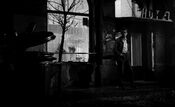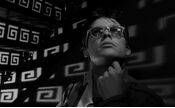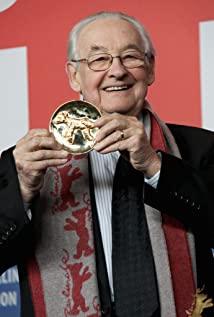Among Polish directors, the traditional gentry character inherited from generation to generation, the romanticism tradition of the nineteenth century, and the consciousness of the intellectual class are probably a swan song here. Zanussi is hard to find, let alone people like Polanski and Jerzy Skolimowski. He is a typical Polish, like his own ill-fated motherland, obsessed with failure and hopelessness, even if it is low in the dust, he still retains arrogance and disdain for the little things of Lara. Dostoyevsky wrote in "Notes on the House of the Dead" about Polish convicts, who were aristocrats, "hardly interact with other people...with a cold, inaccessible, courteous manner Isolate yourself from others". The character of the Poles makes Vajda hopelessly nosy and caring about the big things. He still has Shilachita's genes in his body, otherwise he would not directly satirize Yaruze when he filmed "Dandong" in 1983. Under the martial law of Ersky, he would not use "Marble Man", "Iron Man" and "Man of Hope" to establish a biography for the Solidarity Trade Union. Critics think that the theme he chose is too overwhelming. Looking at it now, "Dandong" is indeed not as flexible and tortuous as Kieslovsky's "Endless" with the same theme. It is not so soft, nor so deep. . Compared with directors of the same generation, Vajda is too classical. In the second half of the twentieth century, when he admired the art of splicing and opposed interpretation, he was a somewhat clumsy giant, which embarrassed the art film industry, which was turning to introspection and retreating into dreams. , He is more like a director in the 1950s, with the shadows of Howard Hawkes, John Houston and Carol Reid, plus some unique Polish flavors. "Romanticism", "heroism", and "Baroque lens language" are words that critics like to use on him. These words seem to bring people back to the nineteenth century when Adam Mickiewicz, "Pushkin of Poland" lived. And we know that Vajda has directed Mizkiewicz’s most famous long narrative poem "Mr. Tadush". As far as artistic style is concerned, Mizkiewicz can’t be more suitable than him in the whole Poland. People.
1945 can be said to be the "zero year" of Polish cinema. The directors of the pre-war generation either died on the battlefield or were locked up in concentration camps or labor camps and never returned. Everything starts from scratch. Warsaw has been in ruins. Three years after the end of the war, the government chose to establish a film school in Lodz, and then moved back to the capital after the reconstruction of Warsaw was over. Never thought that the Film Academy never left Rhodes.
Wajda, who enrolled in 1949, was an earlier group of students at the Łódź Film Academy. It was not difficult to be admitted by it at that time. Wajda was admitted almost by mistake. In just a few years, it became an ivory tower. Polanski had to go to school with extreme twists and turns. Finally, relying on the experience of being an actor in the Wajda movie, he squeezed the log bridge. It took three years to get admitted. Vaida didn't like Rhodes, nor did he like this school. He and Polanski are both Mrs. Krakow. Compared with the ancient cultural city of Krakow, Lodz is dirty and shabby. It is an industrial city. Chemical factories and textile factories are smoky day and night, and the glass is covered with ashes. The road can't help but say. The ground is straight and lacks charm. He has never liked it here. In his movie "Blessed Land", Rhodes is full of intrigue. Later, in 1955, Poland established a film group system known as the history of shadows. Wajda joined the Kdar group later known as the "Polish Film School". The leader of the group was his fellow Krakow’s Jerzy Ka Valerovich, the actor in his debut "A Generation", turned out to be many alumni of his Krakow Academy of Fine Arts, like Cibulski, Polanski, and even Cavalerovich.
The years spent in Krakow as a teenager were crucial to the influence of Vajda's style. Kieslowski once said, "A person's life depends largely on the person who patted you at breakfast in childhood. The person who beat you because you were naughty at breakfast at the age of four will later take the A book is on your bedside."
Wajda did not have noble blood. His grandfather was a farmer in the outskirts of Krakow. Four brothers from his father's generation entered the intellectual class by their own efforts. His father became a cavalry officer, and his second uncle became the stationmaster of the railway station. The third uncle opened a large lock shop. Wajda claims to be "the second generation of the intellectual". The "intellectual class" is a unique landscape of Polish society in the twentieth century. Intellectuals here believe that they have unique ethics and responsibilities. Milosz said, "Except here, nowhere in Europe, artists, writers, and scholars have enjoyed such a supreme privilege.... The "gentry culture" of the intellectual class has survived to this day, and it has its traces on Polish peasants and workers. "Wajda recalled the influence of his parents, and said, "Father and mother are the kind of people who work for others. I think that the Polish intellectuals had this quality at that time. You can't help but do it. Others live, not for oneself."——Waida cares about the words "live for others". The power of all his films comes from the way they intervene in certain major controversies and speak out in all events, whether historical, ideological or social. So, when film alone couldn't satisfy him, he joined the government and became a member of Parliament.
Wajda was thirteen years old when the Second World War began. In the following years, he joined the national army with the current, but did not participate in underground activities, and did not go to Warsaw, hundreds of kilometers away, to participate in the uprising. Because of the lack of identification, he had to stay in the house every day during the occupation, working in San Shu's lock shop, could not go out, and even dared not ride the bus. All news from the outside world is heard. During World War II, under the protection of his uncles, Vaida missed all major events. Perhaps it is precisely because he has not participated in any magnificent actions that he has a romantic fiction, and he can confidently and boldly look forward to the heroism that was strangled in World War II. Therefore, the resistance movement he presented is the energetic "Generation". His reconstruction of the Warsaw Uprising is a fatalistic and tragic epic "The Sewer." In the eyes of Anjiey Munch, who participated in the uprising, the Warsaw Uprising is a satire like "Heroes". The filmmakers who have experienced in the underground organization have experienced the intrigue on the same boat. There is no black and white distinction, and no more open and upright. The heroism and romance are stuck in the mud, and they can't stand upright. Unlike Vaida, their works are filled with suspicion and doubt (Jerzi Cavalerovich's "Night Train"), or the divergent Rashomon (Munch's "Man on the Rails").
Wajda's father died in the Katyn tragedy. However, until 1989, he did not know that his father had died there. So the absence of the father became a thing hanging in the air-the father is no longer there, but he may come back at any time. Everything is hanging in the middle of anxiety and waiting. "On September 1, 1939, the cliff of my childhood generally ended. I began to wait for my father to come back, and every Christmas reminds me that another year has passed, and he is still absent." The whole family is absent every year. Waiting for his father's return, when the war ended in 1945, Vaida went to Krakow to study fine arts, while his mother still stayed in Radom's resident. By 1950, the whole family finally realized that he would probably never return. For fifty years, there has been no father's name on the family cemetery. He must have imagined that if he writes his father's name, his father will return one day, and he will find himself absurdly excluded from this world. Isn't "Ash and Diamond" telling such a story? A person lives, but is not needed by the world. Everyone in the movie talks about Warsaw. Macek, the bartender, and the old man at the hotel reception are all talking about Warsaw, and Anjieyi will "return to Warsaw" after the mission. After watching the movie, people only remember Warsaw, but they don't know where the story happened in the movie. Warsaw is "somewhere else", and this "other place" actually doesn't exist anymore. Like Hitler said, it has become "a point on the map." These people were needed in Warsaw before, but now they are not. The Red Army has entered. The chestnuts in Warsaw have come to fruition, but they are not the ones who picked them. At the end of the movie, the old man asked Macek to pick up a street in Warsaw, but Macek ignored him: he could not go back himself. Missing images and images from elsewhere have been spreading in "Ash and Diamonds". It wants to say a lot, but it always wants to say nothing.
Okay, let’s talk about Ashes and Diamonds here.
When it comes to Waida’s best work, different people have different opinions. Some people say it is "The Sewer", some people say it is "Everything is for Sale" and "The Wedding", and some say "Iron Man". He is most satisfied with this one. Ashes and Diamonds.
The most exciting part of the movie is around 37 minutes. Macek and Angeli were in the bar. Suddenly, the noisy bar was no longer there. People crowded into the hall next door to watch the performance celebrating the end of the war. Only the two of them were left at the bar. The door was open in the hall, people squeezed at the door, and everyone turned their backs to both of them. The next door is bright, and the light here is dim. The female singer in the low-cut dress sang a war song: "Did you see the ruins on the top of the mountain? Your enemy is hiding like a mouse..." Ironically, it is the national soldier Macek and the national soldier who are hiding now. An Jieyi.
Macek lit a glass of vodka on the bar, and the flame popped. An Jieyi reluctantly recites the name of his dead comrade-in-arms. Puff, light another cup. puff. One more cup. The flames flickered, and the vodka was only half a cup, which would soon be extinguished. It's like a perishable life. When the last two cups were being ordered, Anjieyi blew out the match and touched the cup smoothly: "We are still alive." Macek smiled bitterly.
——It's still those old days, Anjieyi. How good it was to be in one piece at that time. What a nice group of people.
--so what? They are all dead.
——It may be that, but life was better then.
——We are all different from now.
--younger.
——Not just that. We used to know what we wanted.
--may be.
——And they want us too.
Macek and Anjieyi are soldiers of the former national army. They are said to be the "former" national army because the national army was disbanded before the war ended in January 1945. It was not because of its passive slack, but because of the change in the international wind. Poland was included in the sphere of influence of the Soviet Union after the war and could not be restrained by other countries. The largest resistance organization on the European continent during World War II was controlled by London. It shouldn't exist either. Soldiers of the national army have only three paths before them: disarm, disappear, or die.
In wartime, the main activities of the national army are intelligence work, road breaks and assassinations. The problem with Wajda's "A Generation" is that he helped the Communist Party build the myth of "the party-led underground struggle". In fact, the national army is the main force of the resistance movement. If the London government-in-exile returns to Poland, the fighters of these underground nations will surely be honored and treated as heroes. And now, they are seen as a factor of instability, which is a pungent joke made by history to Poland. These children, who are accustomed to carrying a gun in their hands and living in danger, are now expected to forget the past as much as possible and lose the experience of conspiracy. Someone succeeded in doing this, pretending that they had never been "underground". Some stayed in the forest, and anyone caught was sent to prison. Anjieyi knew, "Nothing is true in this country anymore." But Marchek was so nostalgic, he couldn't forget. Without forgetting, there is no way. Like being exiled on top of a floating ice cube; I don’t know when the ice cube will melt.
The female singer in the hall sang the battle of Mount Cassino. The battle itself is a huge irony. Mount Cassino is not in Poland, but in Italy. The Poles who attacked this mountain thousands of miles away were Polish prisoners of war who were captured by the Soviet Union after the Soviet Union annexed eastern Poland in 1939. They were led by General Anders and escaped from the Soviet Union. Almost all the soldiers in the army came from eastern Poland and were extremely hostile to the Soviet Union. They were willing to be ordered to detour to southern Europe to fight in order to one day return to Poland. But ironically, just as they were working in Italy, the "Yalta Agreement" was announced, agreeing to divide the eastern border of Poland with the Curzon Line, which meant that the entire eastern part of Poland was again in the hands of the Soviet Union. From that moment on, the Poles lost hope: if they win, they can't return home, and if they lose, they can't die. The battle of Mount Cassino was fought in this mood. It was a totally meaningless war. Many Poles have since stayed in Italy because they have no home to return. In the lyrics, "all the poppies on Mount Cassino will be more vivid because of the blood of the Poles." Only Poles can know the bitterness.
Every word of the song sung in "Victory Day" reflects the situation of Macek's hesitation and helplessness.
Wajda studied fine art at the Krakow Academy of Fine Arts for three years. Among his favorite paintings is Jozef Mehoffer's "The First Fall": "The "First Fall" impressed me. Jesus was The neck was strangled, as if being hung on a rope, the crowd gathered in the street, laughing and laughing, and derive pleasure from the suffering of the victims, and the physical pain was magnified in their ridicule."
He liked the contrast effect. . He wanted Macek to shoot at the statue of Jesus at the beginning of the movie, and let the Communist Party Secretary Shizuka pounce in Macek's arms after his death. At the moment Schukatz fell, fireworks were to bloom in the dark, to stain red and white cloth with Macek’s blood, and finally to let Macek die on the garbage dump. He asked Marek, the youngest in the whole movie, to stare at the hot and shiny lampshade in front of him, with a moth fluttering in the lampshade. Tell the audience that this is the future of Poland.
The film has two important plots related to the church. One is that at the beginning, Macek and Andrzej lie in ambush in front of the church. After the dead fell, we saw Macek’s muzzle facing the statue of Jesus in the church. The second is that in the bombed church, under an upside down crucifix, Marchek hesitated and confided to Eve:
"I want to do something to let me live a different life... …You know, I haven’t considered a lot of things until now. Life is just like that without knowing it. To put it simply, I just want to survive. I just want an ordinary life, regaining my studies, and then graduating from high school. The above technical college..."
Should I stop and think? Godard told a story about Passos in the works of Alexandre Dumas in the movie "As You Like It". This person is an actor. When he first thought about it, he was killed-he buried the explosives, and just about to run away, suddenly stopped and wondered how a person can walk: why step forward One leg, then another leg. At this time the explosive exploded and he was killed. Stopping is fatal. "You must know that you have only one choice. In such a Poland, where can your past take you?" Ordinary life is also a luxury. In 1980, Kieslowski made a short film called "Peace". It was about a Polish who had been released after serving his sentence. He didn't have much demand for life. He stepped back and didn't need anything. Just want to live peacefully. But in the end, he couldn't even get such a little bit.
When Macek spoke, he was out of focus. The focus of the camera is on the upside-down statue of Jesus. Macek just sat vaguely in the corner of the camera, helpless, unbalanced, and ignored. The foreground is the faith that was hung there upside down, dangling, and might fall down at any time and be planted in the rubble. The wood creaked and groaned.
Returning from the ruined church, Marchek kissed Eva goodbye, and a white horse walked safely into the camera. The clear and empty horse hooves in the sound track hinted that this was a surreal scene. When Macek saw the horse, he was a little surprised, then smiled, sniffed the horse with the pansy in his hand, realized something, and turned around and entered the house. Anjieyi and his assassination mission are waiting for him inside. Macek asked Anjieyi: "Anjieyi, do you believe in all this?" Anjieyi asked back: "Is this important?" It was Victory Day, and many children were selling pansy, the national flower of Poland. An Jieyi also bought one, but threw it away in the trash can.
According to Wajda’s own statement, the white horse here borrows from John Houston’s "The Night Is Not Quiet". The horse in that movie also appears at the end of the film, and Sterling Hayden hobbles at the last moments of his life. To it, die at its feet. When he was a child, he once lost his horse, as if he lost his innocence, now he finds it back. In the Catholic country of Poland, the white horse has other meanings. "Bible Revelation" wrote: "I watched and saw a white horse riding on a horse, holding a bow, and giving him a crown. He came out and won and will win." It is more accepted by everyone. The explanation is that the white horse symbolizes cleanliness, purity, righteousness and praise, and symbolizes the preaching of the gospel. However, it is well known that the white horse is the first living creature in the seven seals. The following seals released war, plague, and death in turn, and the people did not live a life. Is this alluding to Poland's repressed and awkward fate after the war? In any case, after filming "Embers and Diamonds", the next year, Waida directed "Lotona", the film is a fable, the protagonist is a white horse-Luotona. It is a symbol of Polish knights since the Battle of Grunwald, elegant, noble, and represents the last romanticism. At the end of the movie, the white horse was killed by the Poles themselves.
Vaida pays attention to rhythm and color, and each of his shots seems a bit excessive. In the language of the shots, he uses too many symbols. Using a deep focus lens like Orson Wells, his compositional tension is severely excessive, and the actor's performance is also excessive. Therefore, Zibulski can fully explode his acting skills under his lens.
Zibulski has very poor eyesight, and when he is close-up, his eyes are not very condensed and lacking in expression. He tried to make up for this defect with action. He is a drama actor and a pillar of the BIM-BOM theatre company in Gdansk. The performance of the drama was brought to the movie by him. Exaggerated, but controlling the rhythm and rhythm, in the several long shots in the film, his movements seem to pull the air in the shots together, making the atmosphere hanging and unnerving tension at all times. Vajda gave him a lot of freedom, what he looks like in life, and what he looks like in movies. Cibulski said: "There are two types of actors, one to adapt to the role, and the other to stay true to me. I prefer performances with a personal touch. I know it is difficult and dangerous."
Since then, Zibulski played the sequel to "Embers and Diamonds" "Twenty Years Old Love", and his same sunglasses appearance also appeared in "Night Car", "Innocent Exorcist" and his own screenwriter " Goodbye until tomorrow, but he never surpassed this role again. He has a close relationship with Wajda. The two are alumni of the Krakow Academy of Fine Arts. Cibulski's big screen debut "A Generation" also happens to be Vajda's directorial debut. In "A Generation", Vaida originally gave Zibulski a very characteristic negative role. There were many scenes. As a result, these scenes were cut off by the censor. The reason was that it was a film dedicated to the 10th anniversary of the National Day. "Young people should not have negative roles." So in the "Generation" I saw today, Zibulski only showed up at the beginning of the film. He wanted to get on a German train with the protagonist, but the protagonist went up, but he didn't. It was almost a prophetic plot. Thirteen years later, while habitually picking up trains at the railway station, Tsipulski accidentally slipped under the rails and died unfortunately. It is said that he had just received an invitation from Broadway at that time, asking him to play "A Streetcar Named Desire" in the United States. He died young and made his first movie a reality. Coincidentally, after another 13 years, Kieslovsky, a younger generation in the film industry, began to prepare his "Song of Destiny", which is a story of a young man catching a train. Kieslovsky offers three kinds of Possibly: the first two are caught up with the train, the third is missed. The film is open, but the ending does not seem to be open. At that time, Poland was under martial law for more than a year. From a pessimistic perspective, no matter what kind of possibility, there is no hope for the result. This seems to echo the death of Zibulski 13 years ago, even if he survives, so what.
After Zibulski's death, Wajda unexpectedly wrote and directed a film "All for Sale". The theme of the film was that the director wanted to make a film, but he couldn't find his own actor. Everyone knows that his actor is Zibulski. He died and everything stopped, but everything went on again, indifferently going its own way. This is Vaida's most personal work, in the style of Fellini's "Eight and a Half". Directing for more than sixty years, this is the first work he has personally acted as a screenwriter, which shows how important Zibulski is to him. Up to now, there are only two works written and directed by him. The other is "Katyn", where his father died.
Finally, let’s talk about the script of this movie. It was born as tortuous as the fate of Poland, full of wry smiles and irony.
The film is adapted from the novel of the same name, written by Jerzy Andreevsky. This name may not be familiar to the Chinese, but if I say that he is the "Moralist Alpha" in Milosh's "The Imprisoned Mind", then many people will be familiar with it. At the end of the chapter, he did not name the work that Milosz added. In fact, it was "Ashes and Diamonds." Of course, when Milosz wrote "The Imprisoned Mind" in the early 1950s, he had only read the first edition of this book. At the time, there was no need to name the book. People knew which book it was. It was too famous. Milosz said that during the period of resistance, Jerzy was regarded as the leader of the underground altar who had fallen to Warsaw. “The funds for underground activities flowed into his hands, and he then distributed them to his counterparts in desperate need.” He was favored by the London government-in-exile. people. He participated in the Warsaw Uprising, nightmarish days. Every day, friends are executed, but in return there is still hopeless waiting. The Western army is far away, and the Soviet Union has already come in. People are disappointed with the promises of the West and do not know where to go. In 1946, he set about conceiving his first novel after the war. He turned left and stood on the side of the Soviets. He believed that this book would establish his status in the new era. He was the oldest in the literary world. , I am used to sitting in the top spot, so I don't want to put down the shelf, especially for the fear that the younger generation will surpass myself. Jerzy was heavily influenced by Conrad's style and tended to create serious monk-like characters. Before the war, most of his protagonists were priests. This time they changed their coats, put on communism, and reappeared in front of people. This book is "Ashes and Diamonds". The theme of the novel is quite different from that of Vaida's later films. The protagonist is not Marcek, but Shizuka, an old Communist Party member. This person is silent and rock solid, with a rare moral character like an astronaut on the moon, and fulfills his yearning for good with his own suffering. On the other hand, Macek was just a morally depraved young man, aimless, either dying by himself or killing others. Sure enough, this book allowed Jerzy to gain both fame and fortune under the new regime. He didn't write this under pressure. At this time, socialist realism was far from spreading to Poland. In the eyes of many in the literary world, dealing with the devil in this way would be tantamount to self-defeating martial arts.
In 1950, the political oppression in the art world became more and more intense. At this moment, Jerzy took the lead among writers to join the United Workers' Party, criticized himself, and declared that he would be separated from the past. In 1954, he set about revising his most prestigious work, Ashes and Diamonds, to make it more politically correct. In the second edition of this book, a lot of socialist "newswords" were added, which was more in line with the political theme of class struggle rather than partisan struggle at that time, because Poland had no party affiliation long ago.
The matter is not over yet. In 1957, after the editor-in-chief of the magazine "Europa" was ordered to cease publication, Jerzy withdrew from the United Workers Party angrily. Interestingly, it was not long after Gomulka came to power at this time that Polish culture thaw. In any case, since then, Jerzy changed another person, completely standing on the opposite side of the United Workers Party, and becoming a fierce critic of the government. Soon, he began to work with Wajda, adapting "Ash and Diamond". So there was a third version, the version in the movie. There is no doubt that this is the best of the three versions. Jerzy has resigned from the party, he has less scruples, and the political climate has eased. The past few years can be said to be the most lenient five years of socialist Poland. In this version, the central character is no longer a steady old Communist, but a restless and at a loss for the former national army soldier. The previously unremarkable Macek becomes the protagonist. The plot spanning several days in the original book is compressed to one day, and the plot is overflowing. Ideology is not important anymore. What matters is life, whether a person has the opportunity to choose a stable and normal life in Poland.
Later, Jerzy Andreevsky worked with Vaida several times. Their second collaboration was "The Innocent Exorcist" in 1960, which talked about the modern boys of the baby boomer generation. As soon as the film was released, the party passed a secret bill that severely criticized the Polish films in the past five years from "The Sewer" to the present. They named Wajda and Munch and others as "too defeatist" and lacked any patriotism. Not worthy of this burly socialist country. This bill sentenced the Polish film school to death. Soon, Munch died young. The rest of the 1960s was a bleak, except for a few people like Polanski and Skolimowski, Polish films were obsessed with self-satisfaction and populism.
An era is gone forever.
"Flame, you don't know in the end the flame/ brings freedom or death/ exhausts all your most precious things/ only remains ashes and noise."
This article was published in "Iris" under October 2016, please note that it is reprinted Clear source
View more about Ashes and Diamonds reviews


